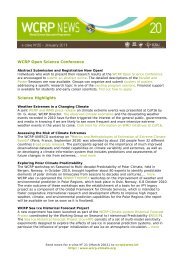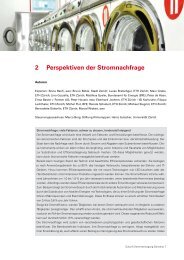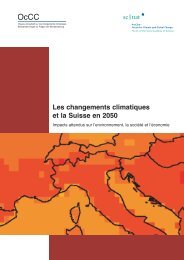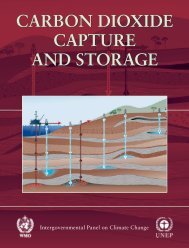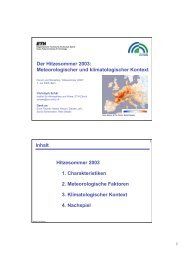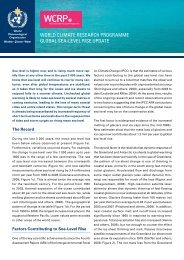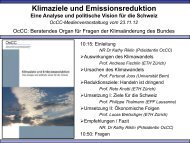Climate Change and Switzerland 2050 - OcCC - SCNAT
Climate Change and Switzerland 2050 - OcCC - SCNAT
Climate Change and Switzerland 2050 - OcCC - SCNAT
Create successful ePaper yourself
Turn your PDF publications into a flip-book with our unique Google optimized e-Paper software.
96 <strong>Climate</strong> <strong>Change</strong> <strong>and</strong> Switzerl<strong>and</strong> <strong>2050</strong> | Energy<br />
1. Introduction<br />
Background<br />
Energy consumption drastically increased in<br />
Switzerl<strong>and</strong> in the 20th century (fig. 1). Since<br />
1945, it has increased by a factor of eight. The<br />
massive rise is due to the increase in the consumption<br />
of crude oil combustibles, motor fuels<br />
<strong>and</strong> gas. However, electricity consumption has<br />
also continuously increased, while the proportion<br />
of coal has strongly decreased. In 2004,<br />
energy use was composed of 31.3% motor fuels;<br />
25.7% combustibles; 23.1% electricity; 12.1%<br />
gas; <strong>and</strong> 7.8% other. The following discussions<br />
are to be understood against the background of<br />
this development.<br />
In the context of climate change, the energy<br />
sector is usually discussed as a causal agent.<br />
Being the most important source of anthropogenic<br />
greenhouse gases, it plays a central role<br />
with regard to measures to reduce emissions.<br />
In this report, we look at this from a different<br />
perspective <strong>and</strong> consider the effects of climate<br />
change on the energy sector. How do warming<br />
<strong>and</strong> the changes in precipitation affect energy<br />
production <strong>and</strong> energy dem<strong>and</strong>?<br />
Energy use for transport is deliberately not<br />
taken into consideration. We assume that the<br />
transport sector will be less affected by the<br />
direct consequences of climate change than by<br />
indirect consequences (climate policy).<br />
Energy (TJ)<br />
1 000 000<br />
800 000<br />
600 000<br />
400 000<br />
200 000<br />
0<br />
1910 1920 1930 1940 1950 1960 1970 1980 1990 2000<br />
Year<br />
The effects of climate change on the energy<br />
sector will be discussed in more detail for the<br />
following topics:<br />
• changes in energy dem<strong>and</strong> (summer, winter)<br />
• established production of electric power<br />
(hydropower, nuclear power)<br />
• new renewable energy (wind, wood)<br />
• economic aspects (energy prices, insurance)<br />
This list is not exhaustive but represents a<br />
range of interesting <strong>and</strong> relevant issues. <strong>Climate</strong><br />
change also affects other important areas of the<br />
energy sector, such as security of supply <strong>and</strong><br />
the supply grid, as well as prospects for other<br />
energy sources (geothermal, solar energy, etc.).<br />
Within the limited range of topics, the working<br />
group did not deal with these areas.<br />
The energy sector is influenced more strongly by<br />
other general conditions than by climate change.<br />
Thus, for instance, influencing factors such as<br />
economic growth, technological development,<br />
population growth <strong>and</strong> the opening of the electricity<br />
market have shaped the energy sector in<br />
the past <strong>and</strong> will continue to do so in the future.<br />
Overview<br />
In the future, less heating energy will be used<br />
in winter <strong>and</strong> more cooling energy used in summer<br />
due to climate change. There will be a shift<br />
Figure 1: Energy consumption in Switzerl<strong>and</strong>, split into different energy sources (1 TJ ≅ 0.3 GWh).<br />
(Source: SFOE Overall energy statistics 2005)<br />
Other renewable energy<br />
District heating<br />
Electricity<br />
Gas<br />
Hydrocarbon fuels<br />
Petroleum fuels<br />
Industrial waste<br />
Coal<br />
Wood








